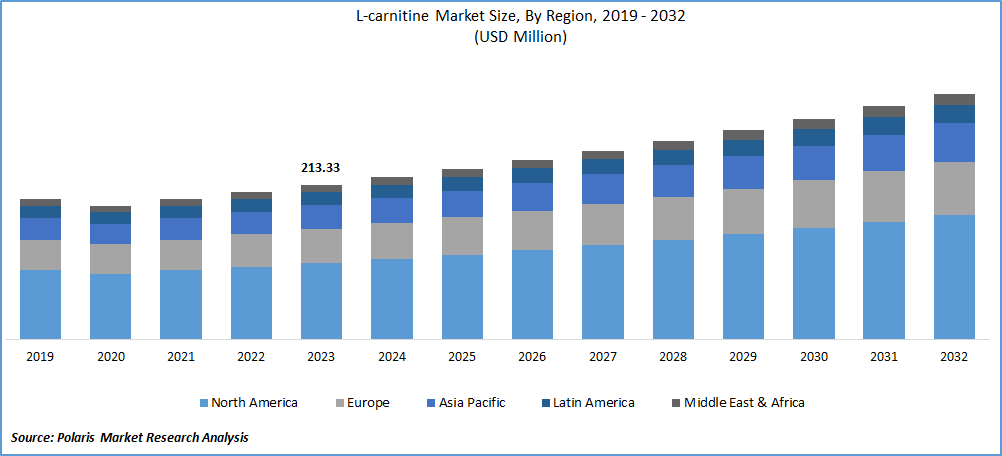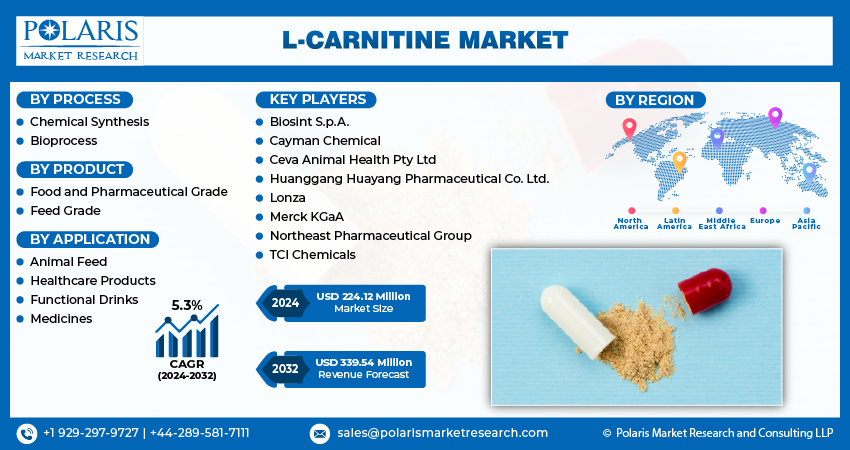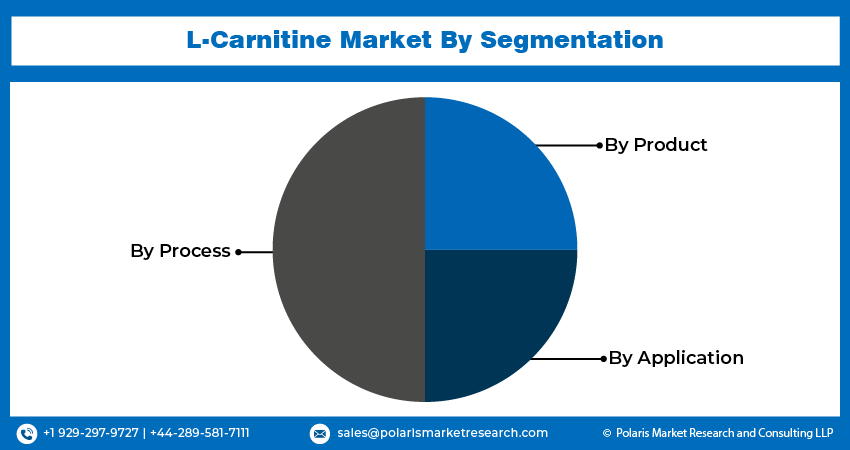
L-carnitine Market Share, Size, Trends, Industry Analysis Report, By Process (Chemical Synthesis, Bioprocess); By Product; By Application; By Region; Segment Forecast, 2024 - 2032
- Published Date:Feb-2024
- Pages: 117
- Format: PDF
- Report ID: PM2033
- Base Year: 2023
- Historical Data: 2019-2022
Report Outlook
The global L-carnitine market was valued at USD 213.33 million in 2023 and is expected to grow at a CAGR of 5.3% during the forecast period.
L-carnitine is a compound that occurs naturally and is derived from amino acids. It plays a vital role in transporting fatty acids into the mitochondria of cells, where they are utilized to produce energy. The body synthesizes L-carnitine from lysine and methionine amino acids, and it is found in high concentrations in tissues requiring a significant amount of energy, such as the muscles and heart. L-carnitine acts as a carrier, facilitating the transport of long-chain fatty acids across the mitochondrial membrane, ultimately contributing to the process of beta-oxidation.
The L-carnitine market is driven by factors such as the increasing awareness of health and fitness among consumers globally. As people become more conscious of their well-being, there has been a growing demand for dietary supplements, with L-carnitine being recognized for its role in energy metabolism and potential benefits for exercise performance.

To Understand More About this Research: Request a Free Sample Report
Athletes and fitness persons are incorporating L-carnitine supplements into their diets, seeking advantages in terms of improved immunity and efficient metabolism. Increasing focus on weight management has emerged as another significant driver for the L-carnitine market, as the compound is often perceived as a supplement that aids in fat loss. The predominance of obesity and the desire for effective weight management solutions have contributed to the popularity of L-carnitine-containing products.
Despite these drivers, regulatory challenges and uncertainties, particularly in regions with strict regulations on health claims and supplement formulations, are hindering the market growth. In addition, the availability of alternative ingredients and the focus on plant-based lifestyles have led to increased interest in non-animal sources of L-carnitine. Vegetables, fruits, and grains have negligible amounts of L-carnitine; hence, it becomes very expensive to extract it from these sources as compared to animal sources.

Growth Drivers
- Increasing usage of L-carnitine by consumers drives market growth.
As consumers become more conscious of their fitness and overall well-being, there has been an increased demand for dietary supplements, with L-carnitine gaining popularity due to its proven role in energy metabolism. The product’s ability to initiate the transport of fatty acids into the mitochondria for energy production has established it as a preferred ingredient, particularly in sports nutrition and weight management products.
Athletes use dietary supplements and energy drinks to stay energized and build muscle. L-carnitine is added to nutritional supplements and health drinks to improve athletic performance and endurance. L-carnitine is a popular supplement among athletes because of its numerous benefits, which include improved muscle repair, reduced muscle soreness, and muscle gain. The product also helps to reduce muscle damage caused by and following strenuous exercise. The increasing use of L-carnitine in functional foods, beverages, and supplements is expected to boost market growth.
Report Segmentation
The market is primarily segmented based on process, product, application, and region.
|
By Process |
By Product |
By Application |
By Region |
|
|
|
|
To Understand the Scope of this Report: Speak to Analyst
By Product Analysis
- The food and pharmaceutical grade dominated the market in 2023.
The market for L-carnitine saw significant growth in 2023, with the food and pharmaceutical grade segment leading the way in revenue generation. This was due to increased demand from end-use sectors. In particular, the pharmaceutical sector has shown a growing interest in using L-carnitine for nutritional therapy. At the same time, the food and beverage industry has utilized it for the production of dietary supplements. Humans primarily consume the product, and it has many applications, including post-exercise recovery, weight management, baby nutrition, male fertility, and healthy aging.
The feed grade segment is also expected to see rapid growth in the coming years, owing to its importance in livestock feed and pharmaceuticals. L-carnitine plays a crucial role in metabolic processes in animals, providing numerous benefits for healthy liver and heart function across a wide range of species.
By Application Analysis
- The healthcare products segment led the market in 2023.
The healthcare products segment has been leading the market due to its utilization in the manufacturing of various healthcare items, such as dietary and powder supplements that promote weight management, vitality, and endurance. The inclusion of L-carnitine in dietary supplements has proven to help treat low blood glucose levels. The product's various chemical properties have resulted in its increased utilization in the healthcare sector.
The use of L-carnitine to promote cardiovascular health and improve physical performance has led to its inclusion in pharmaceutical and nutraceutical products, causing a surge in the healthcare products segment of the market. In addition, as people become more aware of the benefits of L-carnitine, healthcare professionals are increasingly recommending or prescribing products that contain it, further boosting the prominence of this segment in the overall market.

Regional Insights
- North American region is expected to dominate in terms of market share over the forecasted period.
North America is expected to lead the global L-carnitine market during the forecast period. This is due to the region's increased consumption of functional foods and beverages. Also, the pharmaceutical sector's rising research and development activities and the upsurge in various diseases will further contribute to the region's growth. In North America, there is an increasing concern about a sedentary lifestyle and weight management. As a result, many people are turning to L-carnitine for its potential benefits in fat metabolism and weight loss. The sports and fitness culture in the region has further boosted the demand for L-carnitine as athletes and fitness enthusiasts seek nutritional support to improve their performance and recovery.
The Asia Pacific region is projected to experience a significant growth rate in the upcoming years due to the rise in awareness of food supplements, particularly in China and other South Asian countries, where the economic situation has improved. Additionally, the market for L-carnitine is expected to grow due to the high number of obese and diabetic individuals in countries like India and China.

Key Market Players & Competitive Insights
Companies are currently working on their branding strategies to attract their respective target audiences for specific applications. The market is highly competitive, with major companies not only competing with other international companies but also with local players at the regional level. The industry is highly concentrated, with only a handful of players controlling a large share of the market. The market also has numerous smaller players who provide customized products to end-users.
Some of the major players operating in the global market include:
- Biosint S.p.A.
- Cayman Chemical
- Ceva Animal Health Pty Ltd
- Huanggang Huayang Pharmaceutical Co. Ltd.
- Lonza
- Merck KGaA
- Northeast Pharmaceutical Group
- TCI Chemicals
Recent Developments
- In February 2022, Applied Nutrition, a UK-based sports nutrition company, launched a new L-Carnitine sports drink named Carni-Tone, which is a flavored spring water with three distinct flavors: raspberry, summer fruits, and cherry.
- In October 2019, MitoCarn launched a collection of patented L-Carnitine solutions designed for the brain, heart, sport, and weight management.
L-Carnitine Market Report Scope
|
Report Attributes |
Details |
|
Market size value in 2024 |
USD 224.12 million |
|
Revenue Forecast in 2032 |
USD 339.54 million |
|
CAGR |
5.3% from 2024 – 2034 |
|
Base year |
2023 |
|
Historical data |
2019 – 2022 |
|
Forecast period |
2024 – 2032 |
|
Quantitative units |
Revenue in USD million and CAGR from 2024 to 2032 |
|
Segments Covered |
By Process, By Product, By Application, By Region |
|
Regional scope |
North America, Europe, Asia Pacific, Latin America, Middle East & Africa |
|
Customization |
Report customization as per your requirements concerning countries, regions, and segmentation. |
